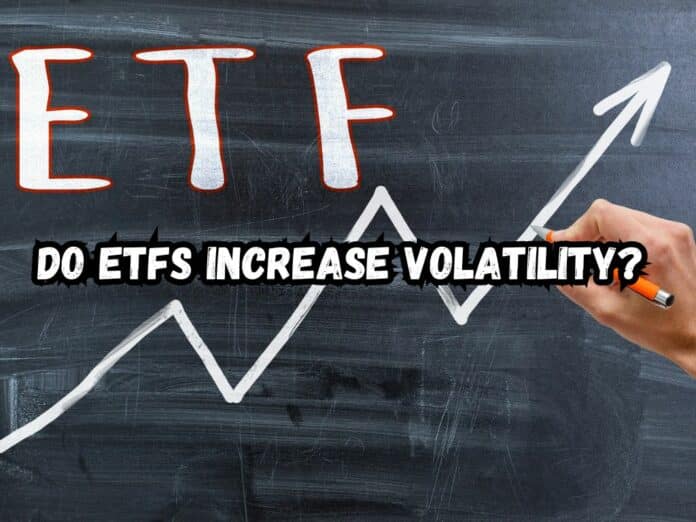Exchange-Traded Funds (ETFs) have become a cornerstone of modern investing.
Given their role in various portfolios, from small-time investors to large hedge funds, questions about their effect on market volatility are frequent and heated.
While ETFs are lauded for their liquidity and ease of access, whether they amplify market swings is a topic of debate. This article delves into the core of this debate, aiming to uncover whether ETFs indeed increase market volatility.
Understanding ETFs
What Are ETFs?
ETFs are funds that track indices, commodities, bonds, or a mix of investment assets. Unlike mutual funds, ETFs trade like stocks on an exchange.
They vary widely, with some aiming to mirror the performance of a specific index (index ETFs), while others use financial derivatives to create leveraged or inverse results.
The allure of ETFs is evident in their benefits, which include diversification, lower operational costs, and high liquidity.
How ETFs Trade?
Unlike mutual funds that trade once per day after the market closes, ETFs trade throughout the day. Prices adjust continuously as they are bought and sold on the market. This trading feature is key in their comparison to traditional stock trading.
The role of arbitrage—involving buying and selling an asset to profit from differing prices—is crucial in ensuring ETFs’ prices reflect the underlying asset values accurately.
Do ETFs Increase Volatility?
Historical Context
Market volatility is not a recent phenomenon. However, the magnitude and frequency of these fluctuations have led many to scrutinize the catalysts.
ETFs, which have seen exponential growth over the past two decades, are often discussed in this context.
Theories Suggesting ETFs Increase Volatility
Some experts argue that ETFs can amplify market movements due to their structure and trading characteristics. For instance, the ease of trading ETFs might encourage more frequent trading, potentially heightening market sensitivity.
Moreover, leveraged and inverse ETFs are designed to magnify the results of their benchmarks, which can exaggerate market movements, both upward and downward.
Counter Arguments: ETFs as Stabilizing Forces
Conversely, many argue that ETFs inject liquidity into the market, providing opportunities for price corrections and reducing volatility. They offer a platform for investors to diversify their holdings easily, which can help distribute and thus minimize risk.
Several studies have highlighted that increased adoption of ETFs correlates with lower overall market volatility.
Analyzing the Evidence
Empirical Studies and Their Findings
Research on this topic reveals mixed results. Some studies indicate that ETFs contribute to higher intra-day volatility but affect long-term market stability minimally.
Others have found no substantial link between ETF popularity and increased volatility.
Market Events and ETF Behavior
Considering specific instances such as the Flash Crash of 2010, some pointed fingers at high-frequency ETF trading.
Yet, further investigation suggested that underlying market conditions and massive sell-orders played more significant roles.
During the COVID-19 market turmoil, ETFs functioned effectively, offering crucial liquidity and absorbing shocks.
Investor Behavior and ETFs
How Investors Contribute to Volatility
Investors’ rapid reactions to market movements, often mediated through ETFs, can exacerbate volatility. Nevertheless, blaming ETFs alone oversimplifies the issue.
It’s also about how these tools are used. Investor education on the strategic use of ETFs can mitigate abrupt market shifts induced by mass buy-sell actions.
Strategies to Mitigate Risk
Investors are advised to adopt a long-term perspective with ETFs, avoiding knee-jerk reactions to short-term market movements.
Awareness of the ETFs’ underlying assets and their typical market responses can also temper unnecessary trades that might contribute to volatility.
Regulatory Perspective
Current Regulations on ETFs
Regulators have kept a close watch on ETFs, implementing rules to curb market disruptions.
These include stringent requirements for liquidity management and stress tests. Such measures ensure that ETFs do not amplify systemic risk.
Proposed Changes and Their Potential Impact
Changes aimed at tightening these regulations further suggest a cautious approach from authorities wary of potential risks associated with ETF trading.
Monitoring these changes is crucial for both investors and market analysts to understand and adapt to evolving market dynamics.
Pro Tips
Investors should keep a close eye on market trends and ETF indices to make informed decisions.
Consulting a financial advisor can also add a layer of personalized understanding critical for managing investment risks.
Finally, a thorough grasp of different ETF mechanisms and their market impacts is indispensable.
FAQs
What is market volatility, and why does it matter?
Market volatility reflects the rate at which the price of an asset increases or decreases for a given set of returns. Understanding volatility helps investors gauge the risk involved in investment choices.
Can investing in ETFs be a cause for concern during market downturns?
While ETFs generally provide good liquidity, their behavior in market downturns can vary depending on the fund type and strategy.
How do leveraged and inverse ETFs affect market volatility differently compared to traditional ETFs?
Leveraged and inverse ETFs seek to deliver multiples or the opposite of the performance of the indexes they track. They are, therefore, inherently more volatile and carry greater risks.
What role does regulation play in managing the impact of ETFs on market volatility?
Regulatory bodies impose rules and standards to ensure that the growth of ETFs does not adversely affect the overall market stability.
How can individual investors assess the risk of contributing to market volatility through ETF investments?
Investors should evaluate their ETF strategies critically, stay informed about market conditions, and perhaps consult financial advisors to better understand and manage potential risks.
Conclusion
The question of whether ETFs increase market volatility does not have a straightforward answer.
While they could potentially lead to certain types of market instabilities, they also offer mechanisms that can help stabilize and rationalize market pricing.
For investors, understanding both sides of this debate—alongside prudent, informed investment strategies—remains key to navigating ETFs effectively.
Meta Description: Explore the impact of ETFs on market stability. Get expert insights and learn if ETFs really amplify volatility. Dive in now!

A writer, editor, and publisher with a knack for crafting informative articles.



